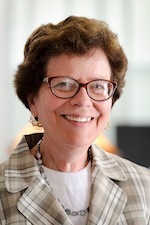‘Bigger is better,’ Blank says in State of the University speech
After a year on campus, Chancellor Rebecca Blank says she has come to appreciate that the scope and breadth of the University of Wisconsin–Madison is what makes it a world-class university.
“A lot of liberal arts colleges attract students and faculty by discussing their close community and claiming that ‘small is beautiful.’ Well, I want to announce that I’m firmly committed to the idea that, when it comes to education and research, ‘bigger is better,’” Blank said Monday during her State of the University address before the Faculty Senate.

Rebecca Blank
“We face many challenges as we attempt to define what it means to be a great public university at a time when state financial support is more limited and when the public conversation about higher education is often more critical than supportive,” Blank said. “But UW has a history of excellence that we can draw upon to face these challenges.”
Blank expressed her support for the state budget proposal put forth by UW System President Ray Cross and the Board of Regents seeking an additional $95.2 million over the next biennium. The proposal includes a “Talent Development Initiative,” which she said would help the state’s economy by “attracting, developing and retaining high-impact talent.”
The system proposal would also mean more resources for the university to expand academic programs in STEM majors, and help address the budget gaps left by deep cuts imposed in the current state budget, Blank said, though there would still be a small deficit, Blank said.
To prepare for an unfavorable budget outcome, Blank said she is having deans and directors do an exercise in which they plan for how to implement cuts of 2 percent, 4 percent or 6 percent in their units.
“I’m firmly committed to the idea that, when it comes to education and research, ‘bigger is better.’”
Rebecca Blank
“As good managers, we have to prepare for the worst, even while we work for a good budget outcome this spring,” she said. “We won’t know until June 2015 what our budget situation will look like for the fiscal year starting July 1, 2015, so we have to be prepared to move fast to implement cuts that assure a responsible budget.”
Blank also reported on the progress of a committee of faculty, staff and students to develop a new internal budgeting model. The new model proposed by the committee “would establish transparent, objective metrics” to guide budget allocations among schools and colleges, but also provides flexibility to address strategic initiatives or campus needs, Blank said.
A series of campus forums on the new budget model are being planned.
“I look forward to a robust campus discussion of the new model,” Blank said.
In addition, Blank said the university is ready to move ahead with the next steps on the 30 recommendations forwarded by the ad hoc Diversity Planning Committee. She said six working committees of faculty, staff and students are developing implementation plans. The working committees will be asked to finish their work by early next year.
“As good managers, we have to prepare for the worst, even while we work for a good budget outcome this spring.”
Rebecca Blank
“I know that many of you have long been working hard on these issues in your own departments, schools and colleges. I appreciate all that you are doing, and I trust that any additional efforts that we take on will advance and complement existing programs,” Blank said.
Addressing campus safety, Blank said her administration is focused on educating students about the strong correlation between alcohol use and sexual assault and other crimes. The university has implemented a number of programs to that end, including AlcoholEDU and an online program called “Tonight” that addresses sexual assault, dating violence and consent.
In addition, the university is working to encourage a campus climate where sexual assault survivors feel comfortable coming forward. A person was recently hired in the Dean of Students office with extensive training in sexual assault report investigation, and University Health Services has brought in a campus-based victim advocate.
“Everybody has a role to play in understanding campus expectations, supporting consequences for those who commit crimes, and creating a safer campus community by being active observers and friends,” Blank said.
Blank also took the opportunity to introduce to the faculty several new faces filling key positions in her administration, including Provost Sarah Mangelsdorf, Vice Chancellor for Research and Graduate Education Marsha Mailick, Guido Podesta, the new dean of international studies, Steve Swanson, the new dean of pharmacy, and new secretary of the faculty Steve Smith.
Blank told the faculty that she remains committed to ensuring UW–Madison continues to grow and change, and to finding opportunities for further investment in education and research
“I look forward to your help and guidance — and I want to thank you for your hard work and willingness to address the challenges we face,” she told the faculty. “Your dedication helps to keep UW a strong and thriving institution.”




